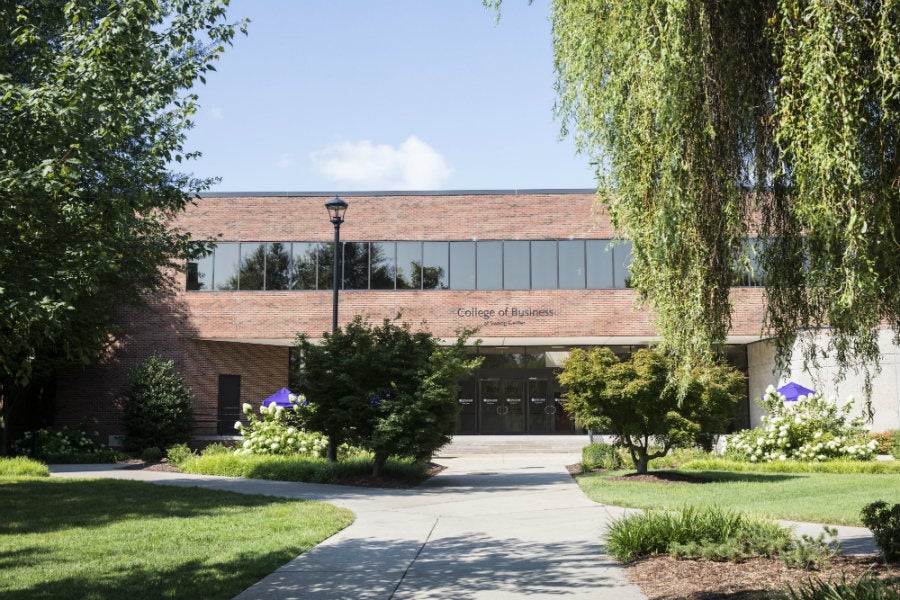Companies learn the importance of Business as Mission during health, economic crisis
College of Business professors share their thoughts on why businesses are finding success in putting their customers and employees first.
Cate Zenzen |

Many industries were challenged by the introduction of COVID-19 to the United States earlier this year. Healthcare workers rose to a significant challenge, educators learned new ways to teach, and businesses needed to adjust to social-distancing and essential worker requirements. A new type of capitalism emerged as companies shifted the focus from earning a profit for itself, to valuing the well-being of the customer.
“One of the reasons for the lack of trust in corporate America and business in general over the years has been the “me-first” attitude. Businesses have for too long put their profits and their shareholders above their customers and their own employees. This pandemic has created a recalibrating effect. All of a sudden businesses are being presented with a new reality that may finally help them realize the true value of the customer and the employee,” said Rob Touchstone, director of Business as Mission within the Lipscomb University College of Business.
When an employee physically cannot show up for work or a customer cannot purchase a good or service as normal, a business is confronted with the humbling reality of dependence. Touchstone suggests this dependency has led businesses to become more service-minded, and really consider the value in customer service. The same can be said for employees -- those who continue to work through the economic and health crisis determine the outcome of their employers. Companies cannot survive without a foundation of loyal employees who work especially hard to keep operations afloat.
“In a country where the corporate world has fought for every fractional margin of a bottom line, we are watching businesses start to consider the ways their sales channels should be run to best safeguard social well-being. More than donating revenue to a social cause or a charitable fund, I believe that companies are being forced to consider their employees as a social cause in which to invest, and this is a huge win for corporate America. Workers are being seen as fathers and mothers with small children at home, and co-workers are often meeting these children for the first time as they pop into a Zoom window,” said Lauren Pinkston, assistant professor of Business as Mission.
Pinkston and Touchstone teach these concepts of humanizing business and using sales channels for the greater good in the Center for Business as Mission within the College of Business. Students not only learn the fundamental aspects of business, but how to use these skills to positively impact communities. With such a foundation, graduates enter the workforce as servant leaders with the ability to adapt, create value beyond just profit, and think of business as one of the greatest tools to create impact.
“Now more than ever businesses are learning to think beyond a single bottom line of profit creation. This is partially because of the pandemic itself, but also because customers are expecting more from businesses. They want to use their consumer buying power to not only receive an excellent product, but to create change and to meet the needs of others,” said Touchstone.
Pinkston cautions that while many lessons will be learned from the pandemic, it will be easy for some to be lost. Businesses must keep their missional values at the center of their company culture lest they forget. However, she also suggests that social enterprises could have a unique advantage in this season of economic shifts. The nature of these companies already requires them to balance budgets and account for fringe benefits to employees with significantly small margins. Smaller companies already stewarding missional business have a lot to teach large corporations on the treatment of employees and their communities.
“With the economy forced to close many sectors, it is vital that businesses see their employees as human beings first, and then whatever role they fill within the company. I’m encouraged to hear from individuals who feel they are being understood by their management, and to hear from business leaders like Peter Demos [President and CEO of Demos Brands and Peter D’s Seasonings] who are prayerfully shepherding their employees through a season of furlough,” said Pinkston.
These small missional-minded companies are already serving communities in big ways. Touchstone uses The Cookery in Nashville as an example. Led by Brett Swayn, the social enterprise restaurant creates jobs and serves meals for the homeless. Even now, as overall profits suffer during the pandemic, they feed 700-900 homeless people weekly.
“Though it may sound counterintuitive, businesses that build service, social impact, and multiple bottom line metrics into the heart of their existence will thrive in the future as this perhaps becomes the most critical aspect of their unique value proposition,” said Touchstone.
Touchstone said Business as Mission can be thought of as a holy collision of business and mission, work and faith, and kingdom and culture. The Center for Business as Mission within the College of Business serves as a hub for connecting students to local and global opportunities to engage and apply what is being learned in the classroom. Known as BAM, the center is an invitation to participate in profitable business as a means of leveraging the marketplace to create sustainable solutions for the common good of those in need, both locally and globally.